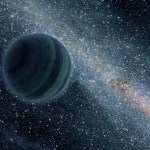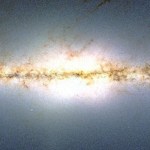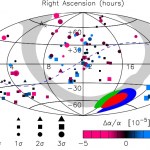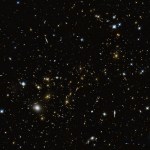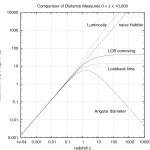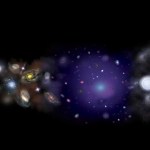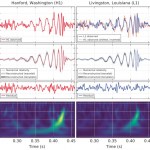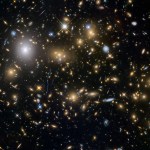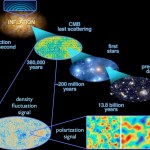
"Other galaxies like Andromeda are shooting these ‘spitballs’ at us all the time." -James Guillochon, coauthor on the new study
Imagine you're a star passing too close to a black hole. What's going to happen to you? Yes, you'll be tidally disrupted and eventually torn apart. Some of the matter will be swallowed, some will wind up in an accretion disk, and some will be accelerated and ejected entirely. But quite surprisingly, the ejected matter doesn't just come out in the form of hot gas, but it condenses into large numbers of rapidly-moving planets.
An artist's illustration of large, rapid…
"Far out in the uncharted backwaters of the unfashionable end of the western spiral arm of the Galaxy lies a small unregarded yellow sun. Orbiting this at a distance of roughly ninety-two million miles is an utterly insignificant little blue green planet whose ape-descended life forms are so amazingly primitive that they still think digital watches are a pretty neat idea." -Douglas Adams
If you want to know how many and what type of chemical elements are present in a star system, you need to make a dizzying, intricate array of observations. You need to break up the light from the star into…
"The mystery about α is actually a double mystery. The first mystery – the origin of its numerical value α ≈ 1/137 has been recognized and discussed for decades. The second mystery – the range of its domain – is generally unrecognized." -Malcolm H. MacGregor
We assume that the fundamental constants are truly constant, but they don't have to be. The speed of light is the same everywhere, but it could have been different elsewhere, either in space or in time. The same is true for other constants, like Planck's constant, the gravitational constant, or even the fundamental charges or masses of…
"Every philosophy also conceals a philosophy; every opinion is also a hideout, every word also a mask." -Friedrich Nietzsche
If you want to see all the way back to the Big Bang -- to the cosmic microwave background -- that means looking back through billions of light years worth of space. While individual point sources like stars and distant galaxies are relatively easy to exclude, the most catastrophic interfering factor is the Milky Way itself. Gas, dust, spinning molecules, magnetic fields, stars and more are all known to play a role.
The alignment of neutral hydrogen (white lines) with…
“I have difficulty to believe it, because nothing in Italy arrives ahead of time.”
–Sergio Bertolucci, research director at CERN, on faster-than-light neutrinos
A little over five years ago, the OPERA collaboration announced an astounding result: that neutrinos sent through more than 700km of rock arrived at their destination 60.7 nanoseconds faster than they ought to. That was particularly disturbing, because the speed they ought to have arrived at was the speed of light, which nothing can move faster than. Either something very, very funny was going on with the experiment, or they had just…
"For me the best answer is not in words but in measurements." -Elena Aprile
Dark matter is perhaps the most mysterious substance in the Universe. It outmasses normal matter and radiation, which includes all the known particles in the Standard Model, by a factor of 5-to-1. The observational, astrophysical evidence for its existence is overwhelming, and there are a slew of direct detection efforts underway here on Earth. Depending on dark matter’s properties, any number of them might claim success at any point in the near future.
The cryogenic setup of one of the experiments looking to exploit…
“You may hate gravity, but gravity doesn’t care.” –Clayton Christensen
If all we had were galactic rotation curves -- like those measured by Vera Rubin -- we would know that something was wrong with our picture of the Universe, but we wouldn’t know how. Two equally good explanations, that there was either a flaw in the law of gravity or there was the existence of some unseen mass, could account for what we saw. But observations of galaxy clusters point to dark matter in a dramatic fashion.
The Coma cluster of galaxies, whose galaxies move far too quickly to be accounted for by gravitation…
"Now this is not the end. It is not even the beginning of the end. But it is, perhaps, the end of the beginning." -Winston Churchill
Happy new year here at Starts With A Bang! No matter how 2016 was for you, there's a new year dawning today, and whether you've got sun, clouds, rain or snow where you are (it's snow here), the Universe beyond our world is still a tremendous place to explore. The latest Starts With A Bang podcast, on whether our Universe itself could be the inside of a black hole, turned into such a sensation (with more listens than any other podcast we've done)…
"It's a brilliant surface in that sunlight. The horizon seems quite close to you because the curvature is so much more pronounced than here on earth. It's an interesting place to be. I recommend it." -Neil Armstrong
There are many impressive optical phenomena that we can see with our own eyes here on Earth. The right configuration of raindrops or ice crystals can produce rainbows, shining light through a prism will separate it into its individual wavelengths, and from high altitudes in the pre-sunrise or post-sunset skies, a full spectrum of colors become visible.
From very high altitudes in…
“The joy of life consists in the exercise of one’s energies, continual growth, constant change, the enjoyment of every new experience. To stop means simply to die. The eternal mistake of mankind is to set up an attainable ideal.” -Aleister Crowley
As we learn more and more about the Universe, we'd like to describe it as simply as possible. While we have thousands or even millions of chemical configurations, they arise from less than 100 different atoms. Atoms themselves are made up of protons, neutrons and electrons. The great hope of unification and for fans of elegance in general is that…
"The only man who never makes a mistake is the man who never does anything." -Theodore Roosevelt
Scientists make mistakes. We fail. We have our intuition lead us astray; we synthesize information in ways that lead to catastrophically wrong predictions. Whether we make sloppy, calculational errors, have oversights in what we consider, or whether we simply engage in motivated reasoning to attempt to reach our desired conclusions, even the greatest of us make mistakes. Even Einstein.
Niels Bohr and Albert Einstein together in 1925, engaging in their famous conversations/debates about quantum…
"Science progresses best when observations force us to alter our preconceptions." -Vera Rubin
When you look at a galaxy in the night sky, it’s easy to imagine that it’s just a system of masses like our Solar System, except on a larger scale. Instead of a single, central mass, you have many stars responsible for the galaxy’s gravitational pull. The stars revolving around the galactic center feel the tug from all the other stars and orbit accordingly, with the inner stars orbiting quickly and the outermost ones -- the ones most distant from the gravitational sources -- orbiting more slowly,…
"It's the first time the universe has spoken to us through gravitational waves, up to now we've been deaf to them." -Dave Reitze
No doubt about it: the greatest science advance of 2016 was the end of the century-long wait for the first direct detection of gravitational waves. Not only were we able to detect the inspiral and merger of two black holes from their emission of gravitational waves, we were able to do it more than once. The announcement was a 101-year-after-the-fact confirmation of one of Einstein’s greatest and most unique predictions.
The signal from LIGO of the first robust…
“Deep into that darkness peering, long I stood there, wondering, fearing, doubting, dreaming dreams no mortal ever dared to dream before.” -Edgar Allan Poe
No matter where you look in the night sky, a powerful enough telescope appears to reveal points of light. Even if you find a region with no stars in the Milky Way, you’re likely to find thousands of galaxies in the deep sky beyond, as the Hubble Deep Field and successor images demonstrated. However, it wasn’t until 2010 and the WFC3 that we were able to get deep, wide-field views simultaneously.
A ground-based view of the region of sky…
"I think that Walter Schirra aboard Mercury 8 was the first of the astronauts to use the code name 'Santa Claus' to indicate the presence of flying saucers next to space capsules." -Maurice Chatelain
Well, here we are: December 25th, Christmas day, here at Starts With A Bang! Whether you're a Santa, a Scrooge or anywhere in between when it comes to the generosity of your holiday spirit, I've got some good things for you. First, there's a brand new Starts With A Bang podcast for you to enjoy, on whether our Universe itself could be the inside of a black hole.
And second, as…
“The very closest stars would require many years to visit, even traveling at the speed of light, which is impossible according to Einstein’s theory of relativity. Today’s fastest spaceships would require 200,000 years to travel to Alpha Centauri, our closest bright star. The energy required to send a hundred colonists to another star, as Frank Drake has pointed out, would be enough to meet the energy needs of the entire United States over a human lifetime. And these estimates are regarding nearby stars. When we consider the distances across the entire galaxy, and between galaxies,…
“You can’t cross the sea merely by standing and staring at the water.” –Rabindranath Tagore
You can’t answer a hypothetical question for certain, at least in science, without doing the experiment for yourself. Here on Earth, liquid water is plentiful; our planet has the stable temperatures and pressures that water needs to exist in its liquid state. Other planets aren't so lucky: with a thin or negligible atmosphere, you can only have solid ice or gaseous water vapor.
The gravitational pull on the gases in our atmosphere cause a substantial surface pressure, giving rise to liquid oceans…
“If antimatter and matter make contact, both are destroyed instantly. Physicists call the process ‘annihilation.” -Dan Brown
Antimatter is the counterpart to matter: it exists with the same mass, opposite charge, and if ever the two should touch, they annihilate away into pure energy via Einstein’s E = mc^2. But there are a great many properties of antimatter that we haven’t yet measured due to how much energy it takes to create it and how difficult it is to contain.
The particles and antiparticles of the Standard Model. Image credit: E. Siegel.
As we continue to make advances on this…
"Just to clarify, neither Jason or myself ... are advocating that it is an alien megastructure, but we also can't completely rule it out." -Kimberly Cartier
When we launched the Kepler spacecraft, we expected that we’d be able to measure the light from over 100,000 stars at once, practically continuously, over the timespan of many years. We discovered a number of planets, variable stars and eclipsing binaries, including many of the most Earth-like planets ever. But one star stands out as unique: Tabby’s star.
The flux, including the dips, in KIC 8462852, exhibiting unprecedented dimming and…
"Because philosophy arises from awe, a philosopher is bound in his way to be a lover of myths and poetic fables. Poets and philosophers are alike in being big with wonder." -Thomas Aquinas
Sure, you've studied a little physics. You know about Einstein and General Relativity, the quantum nature of the Universe and the fundamental particles and their interactions. You know about the Big Bang, and you've read up on the latest theories and ideas. So how did you wind up believing in many (or even all) of these scientific myths out there?
Light and ripples in space; as the light passes through non…
